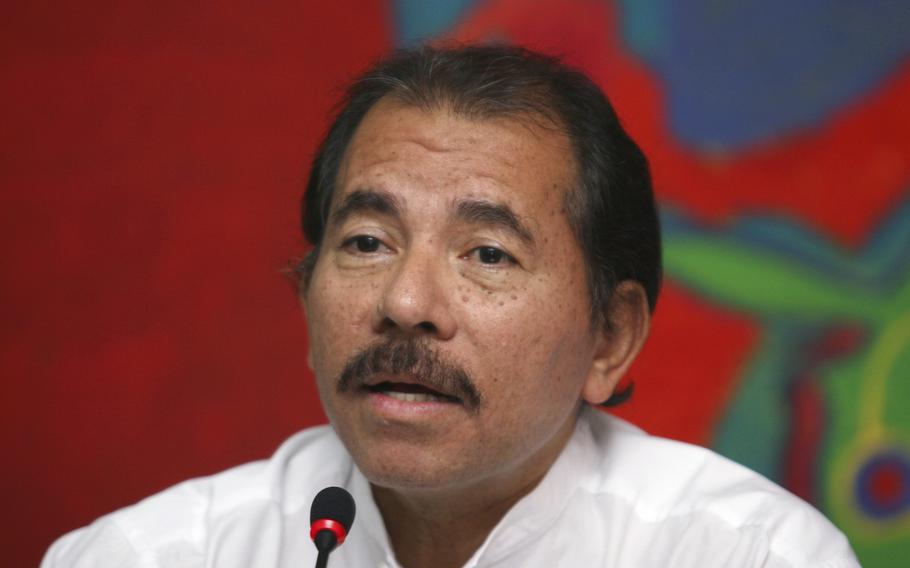Americas
Prominent Nicaraguan opposition leaders and journalists flee an escalating government crackdown
The Washington Post June 26, 2021

Daniel Ortega talks during a meeting in Nicaragua in 2007. (Susana Gonzalez/Bloomberg)
The stream of high-profile opposition leaders, journalists and members of civil society fleeing Nicaragua has surged, as the regime of Daniel Ortega wages the most alarming political crackdown in the country's recent history ahead of a November election.
In the last week alone, several of the most influential critics of the Ortega regime sneaked out of the country - certain they would be detained if they remained. Journalists for mainstream publications were stripped of their passports, but decided to leave any way. Even some of Ortega's former top Sandanista comrades are seeking refuge abroad. The consequences for remaining in the country have become clear: Over the last several months, at least 16 opposition figures have been jailed.
"They are imposing a state of fear in the country to immobilize the whole country and eliminate political competition for the coming election," said Carlos Chamorro, the publisher of the prominent digital newspaper Confidencial, who fled the country this month.
Chamarro left after police raided his house and after his sister - a presidential candidate - was arrested. Confidencial's offices had previously been raided by police.
Journalists have come under near-constant threat in recent weeks. Veteran journalist Miguel Mendoza was detained on June 21, when police broke into his home. The day before that, police arrested Miguel Mora, the former director of 100% Noticias. Mora had stepped down his role at the outlet to run for president.
Julio López, another prominent journalist, was stripped of his passport last week. He decided at that point to seek refuge in Costa Rica.
"Exile was the last alternative to preserve my life and freedom. That moment has come," he wrote in a blog post after crossing the border. "Making this decision has been distressing; I have done it for the tranquility of my family, although I know that sadness overwhelms them."
Sergio Marin, the host of a Nicaraguan political show called Mesa Redonda, or Roundtable, fled to Costa Rica on Monday, after his sources warned him that the Ortega regime was trying to find him, accusing him of being a member of the opposition.
"Journalists who are not on [Ortega's] side, who are not pro-government members, to [Ortega] we are considered coup plotters, bought by funds from the United States government," Marin said.
Ortega, 75, rose to power as a young revolutionary in the 1970s, a leftist who Ronald Reagan once called a "tin-pot dictator." He ruled the country from 1979 to 1990 and has been in power once again since 2007.
While Ortega has made previous attempts to target his opposition - most notably in 2018 - his current crackdown is widely seen as an escalation. The current wave of persecution has reached even members of Ortega's former fellow Sandanista commanders. This week, former commander Luis Carrión was driven into exile, after he heard that his arrest was imminent.
Carrión had become a critic of Ortega's regime in recent years, but told Nicaragua's La Prensa newspaper that he understood the strategy behind the current crackdown.
"(Ortega) has the expectation that these kidnapped people will serve as political hostages to negotiate the lifting of sanctions with the United States," he said.
The United States has grown more outspoken about Ortega's repression. The Biden administration earlier this month announced new sanctions on close Ortega allies and relatives, including his daughter Camila Antonia Ortega Murillo.
"Nicaragua is becoming an international pariah and moving farther away from democracy," Julie Chung, acting assistant secretary for the Western Hemisphere, said in a tweet.
So far, U.S. messaging has appeared to have little impact on Ortega's crackdown. In recent months, the regime has passed a series of bills allowing the regime to intervene in the activities of human rights groups and media outlets.
Between January and May of this year, roughly 4,000 Nicaraguans per month made appointments with the Costa Rican government to formalize their asylum claims, according to the United Nations High Commissioner for Refugees (UNHCR).
The sheer number of raids and arrests of opposition leaders and journalists suggests that Ortega has little concern with maintaining even the veneer of democratic elections. Among those driven into exile this month are former education minister Humberto Belli.
In a statement, Belli described two raids on his house earlier this month, one carried out by men carrying rifles, with ski masks covering their faces. His wife heard one of the men say, 'Now kill them, now kill them.'" But the men left, and the family fled the country.
For the relatives of those detained by the regime, the crackdown has been felt even more acutely. The government has provided almost no updates about their health or whereabouts.
The families held a news conference on Thursday. Victoria Cárdenas, the wife of presidential candidate Juan Sebastián Chamorro, said has not been able to visit her husband.
"I don't know where my husband is, nor how he is," she said. "We're desperate, helpless."
Families demand information on relatives jailed in Nicaragua
This week, Human Rights Watch released a report on the Ortega regime's crackdown based on dozens of interviews with activists, lawyers, journalists and human rights defenders. The authors of the report asked that the United Nations, Latin American democracies and the United States to apply more pressure on the regime to curb Ortega's repression.
"The only language this guy is going to understand is if international community doubles down on diplomatic pressure and with consequences that might affect the business people who are still in bed with the regime," said José Miguel Vivanco, director of Human Rights Watch's Americas division.